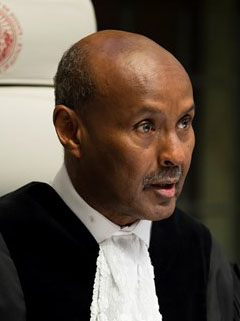THE HAGUE, (Reuters) – The World Court yesterday told Britain to give up control over the Chagos Islands in the Indian Ocean, and said it had wrongfully forced the population to leave in the 1970s to make way for a U.S. air base.
Britain split the archipelago off from its colonial island territory of Mauritius in 1965, three years before granting independence to Mauritius – minus the islands.
In the early 1970s, it evicted almost 2,000 residents to Mauritius and the Seychelles to make way for the base on the largest island, Diego Garcia, which it had leased to the United States.
In a non-binding advisory opinion, the top United Nations court for inter-state disputes said Britain had acted unlawfully in the decolonisation process and should relinquish control over the islands, which it calls the British Indian Ocean Territory.
Although the court was not asked to issue an opinion on sovereignty, Monday’s decision in effect urged Britain to hand the islands, which it has controlled since 1814, over to Mauritius.
But Presiding Judge Abdulqawi Yusuf said in a summary of the decision that Britain was “under obligation to bring to an end the administration of Chagos Islands as rapidly as possible”.
The case at the International Court of Justice (ICJ), as the World Court is officially known, is seen as a test of the legitimacy of deals struck between great powers and small states at the end of the colonial era.
For years Chagossians have lobbied London to let them return. In 2016, Britain extended the United States’ lease of Diego Garcia until 2036 and said expelled islanders could not go back.
Mauritian Prime Minister Pravind Jugnauth said it was “a historic moment for Mauritius and all its people, including the Chagossians who were unconscionably removed from their homeland and prevented from returning for the last half century”.
“Our territorial integrity will now be made complete, and when that occurs, the Chagossians and their descendants will finally be able to return home.”
The U.N. General Assembly asked the court in February 2017 to advise on whether the process of decolonisation had been concluded lawfully.
In his summary, Yusuf said: “The court having found that the decolonisation of Mauritius was not conducted in a manner consistent with the right of peoples to self-determination, it follows that the United Kingdom’s continued administration of the Chagos Archipelago constitutes a wrongful act entailing the international responsibility of that State.”
Mauritius argued that it had been forced to give up the archipelago to gain independence from Britain. Britain maintained that Mauritius had given up the islands willingly.
By 13 votes to one, the judges backed the decision, which is not binding but carries weight under international law.
Diego Garcia has played an important role in conflicts in Iraq and Afghanistan since 1991, acting as a launch pad for U.S. long-range bombers. The United States and Britain both voted against the U.N. resolution seeking the court’s opinion.
Philippe Sands, a member of the Mauritius legal team at the ICJ, said the next step would be for Britain and Mauritius to sit down and work out a handover:
“A way will be found to move this forward, safeguarding the interests of everyone but recognising what the court has said.”










